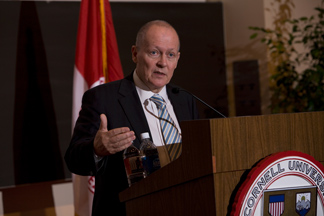Biographer discusses Chuck Feeney, Cornell benefactor and 'the good American'
By Lauren Gold

In the two years Irish journalist Conor O'Clery spent researching Cornell benefactor Chuck Feeney's life, a conversation with Feeney's daughter Caroleen perhaps made the strongest impression.
"I had a long chat with Caroleen about her father," said O'Clery, whose book, "The Billionaire Who Wasn't: How Chuck Feeney Secretly Made and Gave Away a Fortune," was released by PublicAffairs in September.
"She said, 'We all have circles of intimacy. There are the people who are in our immediate family -- wife, daughter, son. And then there are very good friends -- that's another circle.'" Then there are the casual acquaintances; the people encountered once or twice; and the outermost circle, which is the rest of the world.
When something happens in the immediate circle, she told O'Clery, the family feels it deeply. But when misfortune strikes members of the outer circles, feelings are muted. Except with Chuck Feeney.
"With my dad," Caroleen Feeney told O'Clery, "when anything happens in the outer circle, he really feels it. It's as if he makes no distinction."
O'Clery came to Cornell Oct. 24 to talk about Chuck Feeney, Hotel '56 -- the businessman, philanthropist and Cornell's biggest benefactor. The university has reportedly received $700 million from Atlantic Philanthropies, Feeney's philanthropic organization, over several decades -- all under a veil of anonymity.
Feeney has devoted his life -- and over $1 billion dollars, earned through a duty-free shop business -- to good causes, from higher education and health care to human rights and conflict resolution around the globe.
Until recently, Feeney rejected recognition for his giving. He finally agreed to it, O'Clery said, only because he hopes others will follow his example and give while they are alive -- instead of locking the money away in a perpetual foundation.
"He wanted to push forward the debate in philanthropy that the wealthy of today should tackle the problems of today," O'Clery said. In that spirit, Atlantic Philanthropies plans to go out of business in a decade -- which means spending about $400 million per year on four chosen areas: children, the aging, human rights and medical research.
Since the biography was released in September, O'Clery said, Feeney's story has taken off in the press and in the blogosphere.
"Chuck Feeney is the good American," he said. "The image of America in the world in the last few years has been very tarnished by Iraq -- and I think [this] is a story that people can relate to. His giving is just so widespread. He's a true global citizen -- he represents the very best of America."
Meanwhile, Feeney still wears a $15 watch, carries his papers in a plastic bag and chooses the cheapest white wine on the menu.
That appeals to Sarah Campbell '09, a Hotel School student from Cleveland who stood in line to have O'Clery sign her book.
"I never realized who he was. I had no idea," she said of Feeney. "It's very inspiring. 'Live simply' is something I've always believed in. It's really cool to see that."
Media Contact
Get Cornell news delivered right to your inbox.
Subscribe